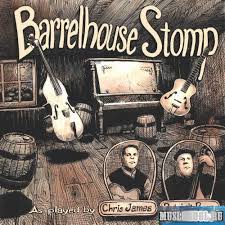CHRIS JAMES & PATRICK RYNN
Barrelhouse Stomp
Earwig Music Company, 2013
Real blues music continues to persevere alongside supposedly “evolved” forms with which it has little in common beyond (sometimes) a common 12 bar structure. Two of its staunchest champions are Chris James and Patrick Rynn. The duo’s new album, Barrelhouse Stomp, drawn from 2009 and 2011 sessions in the company of such all-star contributors as Willie Smith and Willie Hayes (drums), Eddie Shaw (tenor saxophone), Jody Williams (guitar), and David Maxwell, Henry Gray, and Aaron Moore (piano), is a marvel of fresh traditionalism.
James & Rynn, with Rob Stone, write much of their material. “Goodbye, Later For You” shares a tempo and melody line, and an assertive vocal delivery, with such Muddy Waters recordings as “I Live The Life I Love,” and swaggers even more aggressively. “Just Another Kick In The Teeth,” a funky grind punctuated by blasts from a sax trio (Norbert W. Johnson, Johnny Viau, and Shaw), steps into the ‘60s. The solo spots put Shaw, Williams, and bassist Rynn front and center. The instrumental “Messin’ With White Lightnin’,” with its wild, scratchy rhythm guitar and busy bass line, is a perfect Bo Diddley pastiche. David Maxwell takes a terrific piano solo, his heavy attack giving the notes a weighty emphasis, but the star is Williams, whose bloodcurdling lead guitar was the MVP, of course, of Diddley’s “Who Do You Love.” His lines here are a canny mixture of biting single notes and stormy flurries, tangled bends and slippery double-stops. James’s own guitar solo takes the song out, extending Williams’s themes with furious abandon.
Where “Before It’s Too Late” unfolds easily, paced by Moore’s piano, “A Fact Is A Fact” blasts off like a newly-uncovered Broomdusters tune, rocking with fevered, Elmore James-inspired slide work and replete with hard-riffing horns. “It Can Always Be Worse” is a driving shuffle built on a version of Magic Sam’s West Side groove and melody line, with James’s first recorded harmonica work–really solid unamplified playing–leading the charge. Despite the loose, bleary feel of the rumba-style “Last Call Woogie,” the band executes stops as crisp as a gin and tonic. James and the great Louisiana piano man Henry Gray, best known for his work with Howlin’ Wolf, are the featured soloists.
Peppered throughout the album is a handful of fine covers. Big Bill’s “I Feel So Good” arrives early in the set, with the balance clustered near the album’s end. James and Rynn turn Robert Nighthawk’s rollicking “Take It Easy” into a tribute to Pinetop Perkins, with David Maxwell hammering home chorus upon chorus of flying 88s. The group strikes a beautiful lope as James improvises lengthy variations on Elmore’s instrumental “Bobby’s Rock.” Always a confident vocalist refreshingly free of mannerisms, James convincingly hollers Little Brother Montgomery’s “Vicksburg Blues” (a song that lets Williams reprise the guitar part he played on its close relative, Wolf’s “Forty Four”), and outdoes himself in the infectious take on Junior Parker’s “I’m Gonna Stop Foolin’ Myself,” where Williams’s playing is even tougher than on “Lightnin’.” Viau’s honking tenor solo and a powerful groove maintain the tune’s uptown feel.
Listeners familiar with James and Rynn’s history will know not only the tandem’s two previous, highly acclaimed albums of ‘50s-inspired blues, but their recordings with harp man Stone’s C-Notes, their appearances on a number of releases produced by Phoenix harmonica ace and blues impresario Bob Corritore, and projects with Sam Lay, Dennis Binder, and Jody Williams, all demonstrating a deep respect for blues as the music ought to be played. Barrelhouse Stomp, a superb addition to their body of work, proves that traditional blues remains vital, appealing, and exciting.
TOM HYSLOP
I received the review copy of this CD from a publicist, Blind Raccoon.
